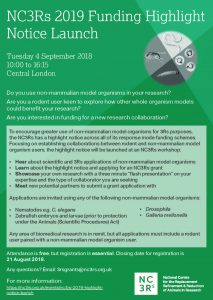18 January 2019
MRC Genome Editing Mice for Medicine (GEMM) call 5
https://www.har.mrc.ac.uk/international-programmes/gemms
This call is specifically for applications where the nominating scientist needs a genetically altered mouse line with a point mutation, indel or deletion mutation.
The MRC has committed £4.5m over 5 years to deliver, via the Mary Lyon Centre, a UK community-driven, bespoke genetically modified mouse service, called Genome Editing for Mice and Medicine – GEMM.
GEMM will exploit the technical and logistical expertise developed at Harwell, together with recent advances in genome editing, to deliver novel mouse lines that will advance knowledge of human disease and/or be of widespread use in biomedical science.
The UK academic research community is invited to nominate mouse lines for production and outline their own experimental plans for them.
Nominations will be assessed by a cross-discipline group of experts across two key themes:
- the nominator’s own research hypotheses and specific research plans for utilising the mouse.
- the beneficial impact that generation of the proposed novel mouse line will have on the wider academic community.
This award will financially support mouse line generation and archiving, but will not support the nominator’s own experimental research costs.
Researchers will therefore be asked to provide their plans for funding to support their proposed downstream work.
There is no limit to the number of applications per establishment or individual scientist.
Guidance for applicants:
Applications are invited for the nomination of specific genetic alterations in the mouse using genome editing technologies.
The following allele types/methodologies are available in this call (subsequent calls will reflect developments in genome editing technologies):
- Indels
- Deletions
- Point mutation insertions
- Cassette Knock-ins
- Conditional or Tm1a allele generation
In addition to single mouse lines, nominations for collections or groups of lines within a specific theme/discipline will be considered.
Applicants are required to submit an online application (through the link above) that outlines:
the nominator’s own research hypotheses and specific research plans for utilising the mouse; the beneficial impact that generation of the proposed novel mouse line will have on the wider academic community; funding plans for supporting the described experimental work. collaborators may supply an optional letter of support which outlines the potential impact on their own research of the mouse line nominated. Principal Investigators will be expected to demonstrate research excellence and a proven track record in their proposed field of study. Home Office authorisation and ethical review should already be in place for subsequent studies on the mouse line nominated.
Assessment Process (assessment criteria available through the link above):
Applications will be assessed, and the decision to proceed with mouse line generation will be made, by a specially-convened group of experts taken from across the UK Biomedical community.
Additional referees’ comments will not be sought. Please note that only high level feedback will be provided to applicants following the Group’s decisions and applicants will not have the opportunity to respond.

